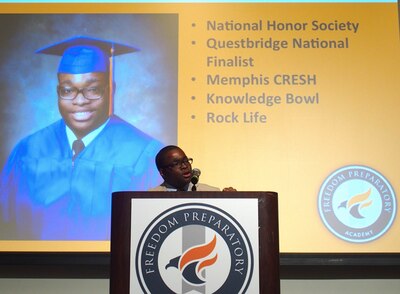When Roblin Webb launched Freedom Preparatory Academy in 2009 with a class of sixth-graders, she made a promise to their parents: College would be a reality for their children.
Now, as those students and others make up the Memphis charter network’s first graduating class, all 50 are heading to college.
Helping the students get there was a remarkable 2.6-point boost in the group’s average ACT composite score — from 16.7 to 19.3 in one year. That’s considered below college-ready, but the score is higher than average for Shelby County Schools and other high schools in the low-income neighborhood served by Freedom Prep.
“Our results tell us that although we still have work to do to ensure our students are highly competitive nationwide, our success locally and statewide lets us know that we are on the right track,” said Webb, a former lawyer and a graduate of Rhodes College. “We expect this success to continue next year and beyond!”
Chief Academic Officer Lars Nelson traces the boost to integration of ACT prep last fall into classes for English and math; three required practice tests throughout the year; and adding a third counselor for the school of 315 students.
The school’s small size helped, too. Most Memphis schools have more seniors and fewer counselors.
But Nelson also emphasizes the foundational learning that happened in the charter network’s elementary and middle schools, as well as an emphasis on teacher development and being an early adopter of the Common Core academic standards, which began in Tennessee in 2012.
“The way to truly prepare students is to see them through 12th grade,” Nelson said. “It’s not just one year of phenomenal teaching. It’s year after year, and then kids are ready for college.”
Like other Memphis schools, Freedom Prep has to manage a high student mobility rate. Freedom Prep had 96 students in its first sixth-grade class, 70 by 11th grade and 50 in their senior year. A spokeswoman said the network does not recruit students to its senior class.
The four schools in the Memphis-based network are considered some of the most successful in the city. Among charter schools overseen by Shelby County Schools, Freedom Prep is the top performer in English and Algebra I and the second highest in biology, according to the district’s latest charter report.

But it’s Freedom Prep’s culture that attracted students like Elijah Tyler, a senior who has attended since sixth grade and earned a 27 on his ACT.
“You know for a fact if you need something, you can go to a teacher; not just academics but social issues,” said Elijah, who got a full scholarship to Rhodes College. “Everyone knows coming into Freedom Prep that the goal is to get into college and get that 4-year degree.”
The high school culture is grounded in a three-week teacher orientation every summer. During the school year, it’s not unusual for Principal Kristle Hodges-Johnson to pop in a classroom up to 10 times a week to give teachers quick pointers that “help them hone their craft at a greater rate,” Nelson said.
Vivek Ramakrishnan, a first-year high school teacher, said the overlap between ACT math and Bridge Math curriculum made integrating ACT prep a natural fit.
“Our leadership recognized how integral writing is to college academic success and prioritized writing in all content areas. Our history and (language arts) teams have pushed kids to writing college-length research papers,” he said. “…We also shifted towards making students interpret and justify their mathematical solutions in writing.”
Though Common Core isn’t perfectly aligned with the ACT, findings from the test company’s national survey helped inform its development in 2009. So, Freedom Prep leaders set out to adapt their classroom instruction early and provided time in the school day for students to prepare, especially since many don’t have access to the internet at home.
“This is a really hard shift for adults to make; it’s hard for students too,” Nelson said of Common Core, which is the basis for the state’s newly revised academic standards that will reach Tennessee classroom this fall.
The charter network focused on bite-size changes over time to help teachers teach differently and ask students more evidence-based questions. When it got hard, teachers reminded students that perseverance is key to the ultimate educational goal: graduating from college.
“We don’t try to insulate kids from that frustration and that’s an important lesson to have,” Nelson said. “We connect the transition with what they came here to do… (which) matters so much more than a standard.”
Editor’s note: This story has been updated to include information about student mobility.

